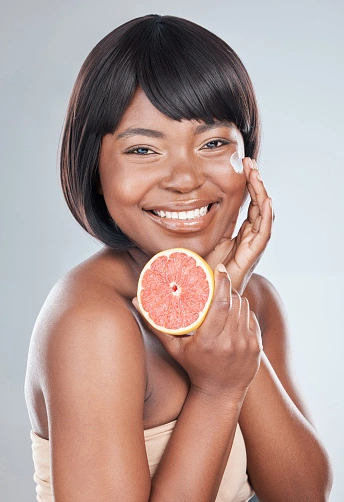Wealth
Vitamin C Benefits: What It Does And How It Benefits The Skin

If you struggle with the early appearance of lines and wrinkles, if your skin looks dull, rough, and pigmented, and if you find it losing elasticity and sagging, skincare products with vitamin C could be your savior. Recommended by dermatologists and beauty editors, vitamin C is a darling for most beauty buffs who use vitamin C-loaded beauty products in their skincare routines.
So, what makes vitamin C a must-have ingredient in your skincare products? Here we give you a low-down on the multiple skin benefits of vitamin C and why you need it in your regular skincare routine.
Table of Contents
Best Ingredients For Addressing Aging Signs
Dermatologists suggest using anti-aging skincare products once you hit your 20s. Some of the most effective and best anti-wrinkle creams and serums on the market are formulated with vitamin C. Other hero ingredients for maintaining radiant, bouncy, youthful skin include hyaluronic acid, retinol, CoQ10, AHAs, and BHAs.
Multiple Skin Benefits Of Vitamin C

As an essential micronutrient, vitamin C is crucial for the body’s growth and cell repair functions. It has wound-healing abilities and supports the skin, cartilage, teeth, and bones. Vitamin C is a potent antioxidant and has anti-inflammatory abilities beneficial for improving and maintaining skin health. Skincare products with vitamin C may help with the following:
- Increased collagen production – Collagen is a protein that helps our skin with structure and support. Due to aging, collagen production decreases, resulting in lines and wrinkles. Vitamin C acts as an essential cofactor that improves collagen synthesis in the body and offers photoprotection. Additionally, it prevents collagen degradation and helps stabilize collagen fibers.
- Fading spots – Vitamin C has skin brightening abilities. Skincare formulations have it as an effective depigmenting agent. It blocks tyrosinase activity responsible for melanin biosynthesis. As this study mentions, topical application of vitamin C has shown promising results in reducing melanin pigmentation. Regular application of topical vitamin C may help fade brown spots.
- Acne scar removal – If your skin is acne-prone and you are annoyed with ugly acne scars and searching for clear skin tips that work, using vitamin C may help fade acne scars. Vitamin C has anti-inflammatory abilities, speeds up wound healing, boosts collagen synthesis, and slows down melanin production. These activities repair the skin damages and brighten the skin, making it appear clear, smooth, and bright.
How Does Vitamin C Work?
The skin, which is the largest organ in our body, has multiple functions. Of its many functions, the most important one is to protect the body from external stressors.
Our skin acts as a barrier that shields the body from pathogen attacks, the harm done by UV rays, and dehydration. Every day, our skin is exposed to several reactive oxygen species (ROS). They are responsible for creating oxidative stress and reasons for extrinsic skin damage. UV rays, smoke, and pollutants in the air harm the skin’s moisture barrier and layers of the skin, change the skin texture, affect cell functions, and even change DNA. UV radiation is especially damaging to the skin as it lessens the catalase activity in the skin and boosts protein oxidation. Vitamin C is a non-enzymatic antioxidant that protects the skin against environmental oxidative stress. Molecules of vitamin C are smaller, and they neutralize ROS by terminating the lipid peroxidation chain reaction and promoting the skin’s oxidant scavenging activity.
Different Forms Of Vitamin C
Vitamin C exists in different forms in skincare products. Whether your vitamin C-spiked best anti-wrinkle cream will deliver the result will depend on the formulation. Which form of vitamin C has been used and its concentration percentage and the formula’s pH level determine the product’s effectiveness. Therefore, a consumer needs to know about the widely used forms of Vitamin C in skincare products.
Skincare experts recommend investing in products that have been formulated with a stabilized vitamin C derivative that doesn’t oxidize fast and doesn’t cause skin irritation.
- L-ascorbic acid – L-ascorbic acid is the purest, biologically active form of vitamin C. However, it is also the most unstable form of vitamin C. In skincare products, LAA is used with other potent antioxidants for increasing molecular stability and improving effectiveness. Formulations containing greater than eight percent concentration of L-ascorbic acid are considered effective. As this study points out, topical application of LAA is effective for better tissue reconstruction. LAA is considered a safe ingredient. However, a concentration greater than 20 percent may cause skin irritation.
- Sodium ascorbyl phosphate – Sodium ascorbyl phosphate is a less potent and gentler version of vitamin C. It turns to ascorbic acid after it is applied to the skin. It does not irritate the skin and may be suitable for sensitive skin.
- Ascorbyl glucoside – Ascorbyl glucoside is another stable and water-soluble vitamin C derivative and appears on ingredient labels as vitamin CG. It can penetrate the skin and after being applied to the skin, alpha-glucosidase, an enzyme, converts it into l-ascorbic acid.
- Magnesium ascorbyl phosphate (MAP) – Magnesium ascorbyl phosphate is a stable precursor of vitamin C. Topicals with MAP deliver vitamin C into the skin and exhibits anti-inflammatory effects. As this study shows, MAP may be considered a supplement for treating inflammatory acne.
- Ascorbyl tetraisopalmitate – Ascorbyl tetraisopalmitate is an oil-soluble vitamin C derivative. Skincare products formulated with this ingredient may be effective as they can penetrate the skin 3X faster than the pure version. Like other vitamin C derivatives, Ascorbyl tetraisopalmitate also offers UVA and UVB protection and prevents free radical damage. It also lowers melanogenesis and increases the skin’s brightness.
Adding Vitamin C To Your Daily Skincare Routine
Now that you know the benefits of vitamin C for your skin, you may wonder how to add this ingredient to your daily skincare. As a natural skin component, vitamin C is present in the dermis and epidermis layers of the skin. With aging, the vitamin C content in the epidermis and dermis layers decreases. Exposure to environmental stressors such as UV rays and pollutants also reduces vitamin C from the epidermis layer. Since our body can’t produce it, dietary intake and topical application are the two ways to supply the body with vitamin C. Dietary intake of vitamin C helps strengthen the body’s immunity, improves iron absorption, reduces uric acid in the blood, and lowers CVD risks and blood pressure. However, topical applications are the best way to deliver vitamin C to the skin for maximum skin benefits.
read for more related blog: Cosmetic Versus Dermatology: Know The Major Differences
Side Effects Of Vitamin C You Should Know
Products formulated with vitamin C are usually well-tolerated. However, certain formulas may cause skin irritation and redness. Persons with super-sensitive skin should consider consulting a derm before applying a product or should do a patch test. Be cautious before applying formulations with a combination of vitamin C and retinol or other exfoliating ingredients. Individuals with skin conditions such as rosacea and eczema should consult a dermatologist before using a vitamin C serum.
Buying The Best Anti-Wrinkle Cream With Vitamin C
While shopping for skincare products that use vitamin C as the key component, you should understand that formulations with vitamin C alone would be less potent than a formulation that combines vitamin C with other strong antioxidants.
For example, Introstem, a skincare brand, has a skin discoloration treatment. This line has serums, cleansers, masks, exfoliators, and other skin products that generously use vitamin C. The Introstem reviews by satisfied customers indicate that regimens with vitamin C may help you get rid of scars, spots, blemishes, and other aging signs.
According to dermatologists and estheticians, serums with a gentler version of vitamin C and other potent antioxidants give you the best anti-aging punch. The most derm-recommended combinations you can shop for include sodium ascorbyl phosphate, hyaluronic acid, vitamins E and B, and ferulic acid.
Vitamin C Product Checklist: Read Before Buying
Undoubtedly, vitamin C is the skincare ingredient you should have in your beauty cabinet. However, there are certain issues you need to keep in mind about vitamin C spiked products before buying and during use for maximum results.
When shopping:
- Buy the derivative of the vitamin C that suits your skin type. If you have sensitive skin, opt for a gentler version to avoid skin irritation. If you have oily skin, L-ascorbic acid may be a good idea. For dry and sensitive skin, go for a gentle yet effective derivative.
- Look for the right concentration. It is safe to start with 10% and increase to 20%, depending on how your skin reacts.
- The pH level is another important factor you need to keep in mind. For normal skin, a low pH of 3.5 will offer optimal absorption. A pH of 5 to 6 is suitable for sensitive skin.
- Serums contain a high concentration of actives. A vitamin C infused serum may offer better vitamin C delivery to the skin than a moisturizer.
- Buy products that come in opaque bottles and airtight pumps. Avoid clear or light containers to prevent light damage.
While using vitamin C loaded products:
- Take time to add vitamin C to your skincare regimen. Don’t expect instant results.
- Store properly. Water-based products with vitamin C tend to be unstable and light-sensitive. It is crucial to store the products in a cool, dark space.
- Use sunscreen with SPF 30 after applying vitamin C for the best sun protection.Read for more amazing blog: What is Salesforce Shield?



















